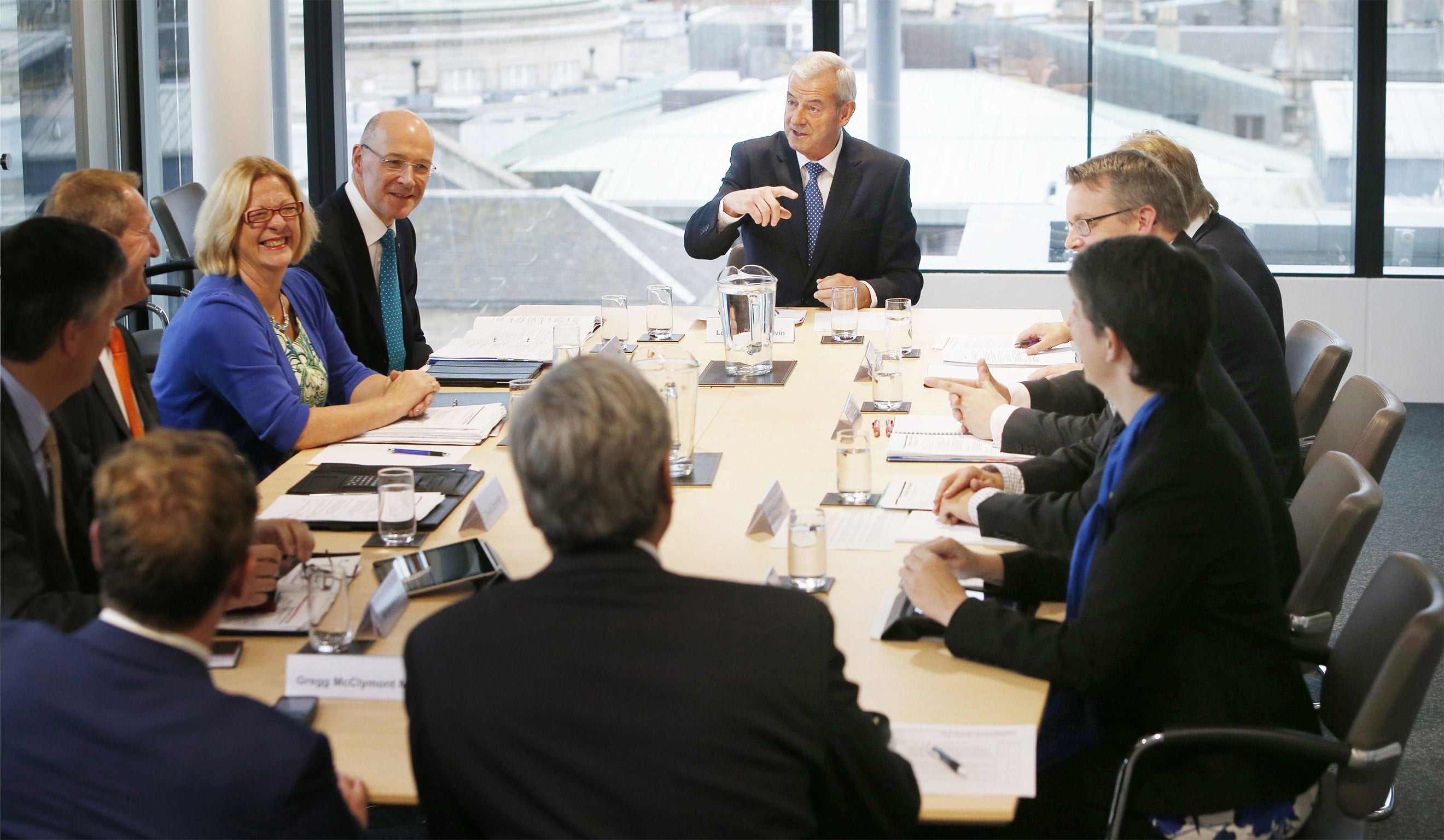Smith Commission on Scottish devolution meets for the first time
Black-out agreed on substance of all-party talks

Your support helps us to tell the story
From reproductive rights to climate change to Big Tech, The Independent is on the ground when the story is developing. Whether it's investigating the financials of Elon Musk's pro-Trump PAC or producing our latest documentary, 'The A Word', which shines a light on the American women fighting for reproductive rights, we know how important it is to parse out the facts from the messaging.
At such a critical moment in US history, we need reporters on the ground. Your donation allows us to keep sending journalists to speak to both sides of the story.
The Independent is trusted by Americans across the entire political spectrum. And unlike many other quality news outlets, we choose not to lock Americans out of our reporting and analysis with paywalls. We believe quality journalism should be available to everyone, paid for by those who can afford it.
Your support makes all the difference.The commission tasked with agreeing the shape of enhanced powers for Scotland’s parliament has met for the first time. In the shadow of Edinburgh Castle, Lord Smith, who is chairing the all-party talks, diplomatically described the opening day as “constructive”.
An immediate black-out by members of the commission on how the historic talks are progressing was agreed. Only the full agreement, if there is one, will be formally announced, around 30 November.
However Lord Smith, a former governor of the BBC and a former member of the Financial Services Authority, almost broke his own commission’s rule, saying it had “good people round the table” who were “committed to work together to achieve a positive outcome”.
Draft legislation in the form of a new Scotland Act is still expected to be delivered to the Commons by the end of January next year.
The commission was announced by David Cameron the day after Scotland’s voters rejected independence in last month’s referendum.
This followed the promise organised by the former prime minister Gordon Brown, that rejection of independence would not mean “no change” for Scotland. Further devolved powers, including greater levels of taxation, was seen as part of the “vow” agreed by David Cameron, Ed Miliband and Nick Clegg.
Among the 10 members of the commission are two representatives from all three main unionist parties, along with representatives from the SNP and the Scottish Greens.
John Swinney, the Scottish government’s finance minister, Michael Moore, the former Liberal Democrat Scottish Secretary, and Ian Gray, the former leader of the Labour Party in Holyrood, are among those taking part. The former leader of the Scottish Conservatives, Annabel Goldie, is also part of the commission.
The SNP want almost full fiscal autonomy, with Labour and the Tories disagreeing on what levels of taxation need to devolved.
Although the agreed silence on the substance of discussions will prevent a running commentary on how the commission is progressing, an early morning private discussion between Mr Swinney and Mr Gray has resulted in assurances from the SNP that they wanted a “positive” outcome by the commission.
Stalled talks could politically be seen as advantageous for the nationalists. Alex Salmond, the outgoing leader of the SNP, has harshly criticised Downing Street’s linkage of further devolution for Scotland to the reform of the Commons in the shape of English-votes-for-English law. Mr Salmond has said Scottish voters were “conned” into voting No on 18 September.
However the private assurances offer by Mr Swinney would suggest others in the SNP believe they could be blamed if seen to deliberately scupper the work of the commission.
In one of the “principles” which will underpin the talks, the commission states its work will “Not be conditional on the conclusion of other political negotiations elsewhere in the UK”.
This is a clear reference to the Cabinet committee headed by William Hague which is examining how reform of the Commons, in the wake of further devolution for Scotland, should progress. Labour has so far decided to boycott the Hague committee.
Smith Commission aims
- Form a “substantial and cohesive package of powers meaningful to the people of Scotland"
- Strengthen Scottish devolution and the Scottish parliament “within the UK”
- Deliver a “durable” constitutional settlement which “maintains Scotland’s place in the UK” through mutual cooperation and “partnership working”
- Not be conditional on the “conclusion of other political negotiations elsewhere in the UK”
- Not cause detriment to the UK nor its constituent parts
- Cause neither the UK or Scottish governments to gain or lose financially
- Be compatible with Scotland and the UK’s international obligations
Join our commenting forum
Join thought-provoking conversations, follow other Independent readers and see their replies
Comments